A place you want to work where each person’s diverse abilities are brought out under the key theme of “getting the most out of their qualities”
In April 2023, the Haseko Group established its D&I Promotion Office.
While the Company has always been committed to promoting the active participation of women, what kind of developments are currently being seen in D&I?
To answer this question, we spoke to employees who are leading D&I in the Haseko Group.
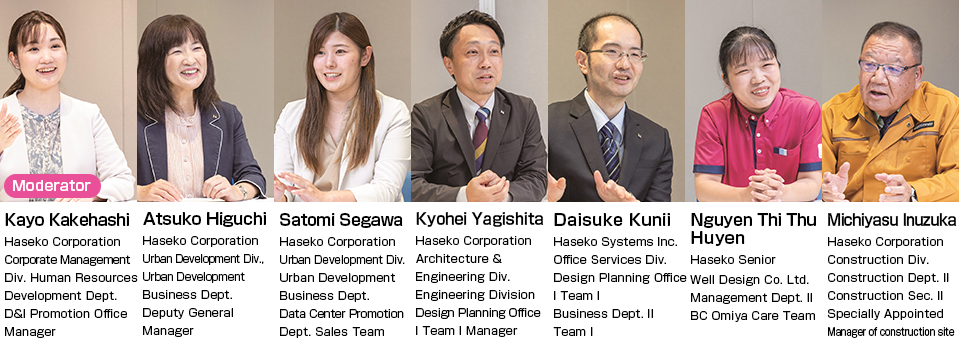
Kakehashi: The Haseko Group has always been supported by a diverse group of people in a multitude of different job types, so in that sense, we could say that the foundations for promoting D&I are already in place. The creation of a better working environment progresses year by year, including through the reform of systems. Today, we will be asking you to tell us how you are all doing in your respective workplaces and to share your feelings about your work and your ambitions for the future.
Promoting the active participation of women
Ms. Higuchi serves as Deputy General Manager of the Urban Development Business Department. She has played a leading role in promoting the active participation of women in sales positions since 2018 from within the Project for Promotion of Active Participation of Women (for Executives). In the past, there were not many women occupying positions in sales. What kind of thoughts have you had as you have been working in this field?
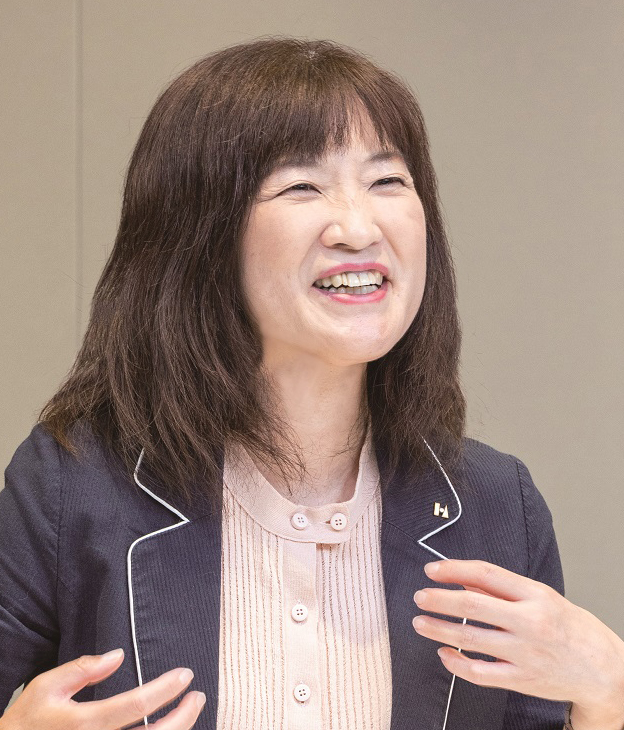
Higuchi: It’s not that I wanted to go into sales when I first joined the Company. I just happened to be placed there. It's true that there were fewer women than men in sales at the time, but I never felt any gender differences, and thanks to the thoughtful guidance of the older employees, I was able to enjoy my work even as a new employee. I have continued to take on challenges with all my might at my job, with the sole aim of making the customers I am responsible for happy. After that, I got married, started a family, and experienced child-rearing. Things have calmed down a bit now, but I think I've always been able to do things in a natural way without having to go out and act tough.
Were you able to balance work and family life?
Higuchi: I was determined to meet my numerical targets, despite constraints on my time, and to do so I made it a rule to set priorities and improve my efficiency. I also needed to spend time with my family, so I had less time to sleep and less free time, but I tried to make up for it by eating tasty food and going to karaoke with my colleagues to unwind. I work hard, both at home and at work, but I am careful not to try to be too perfect. Working and raising children is like running a marathon, so I think it’s important to admit that you do not need to be perfect.
After taking childcare leave and returning to the office, did anything change within yourself?
Higuchi: I took a year of childcare leave, but when I got back to work, I got back into the swing of things immediately. I came to realize that balancing work and family life broadened my horizons. There are many talented women among the mothers I meet at lectures, seminars, and nursery schools, and their presence is a source of great inspiration for me. I also discovered the particular perspective that people with children take when looking for a condominium. In the past, customers may have had the tendency to trust men more (than women), but that is no longer the case. There is no difference between men and women when it comes to gaining trust in the workplace. The important thing for me is to get the customer to be glad to have me as their account manager. I consider it my professional responsibility to make them feel that way.
Ms. Segawa, you work in the same Urban Development Business Department as Ms. Higuchi. Having seen how Ms. Higuchi works from up close, what do you think?
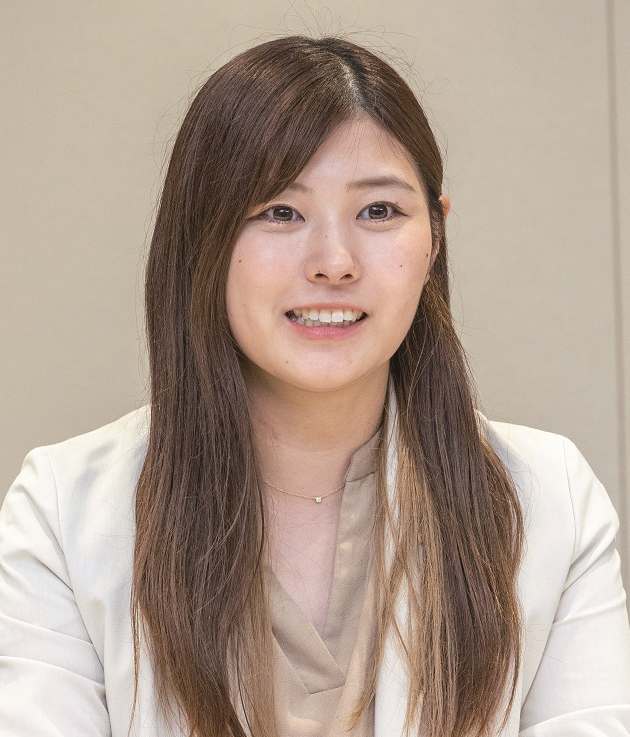
Segawa: The Urban Development Business Department often has to deal with work that is different from the norm. It takes time to coordinate internally, but Deputy General Manager HIGUCHI quickly formulates a scenario for how to address the problem and moves the people in the Company in the right direction. She has an amazing ability to move things forward.
Another thing is that, when communicating with customers, she places great importance on responding quickly and with a delicate attention to detail. Perhaps it's the feminine touch. I want to learn from her the communication skills that will win the trust of our customers.
I heard that you came to your current department through a transfer from a position of different job type. What’s it like to work in sales?
Segawa: I had been doing clerical work as a non-career track employee, but I switched to a career-track position and was transferred to my current department. I started by learning the terminology, but last year, when we worked on a competition project for a condominium, all of my colleagues pulled together to overcome many difficulties. We won the order, and I felt a great sense of accomplishment. I had a feeling that the town was changing as a result of this competition, and I felt a sense of accomplishment in winning the order, as well as how worthwhile sales work can be.
The number of female employees in sales roles is likely to increase in the future, but are there any challenges?
Segawa: I think that there are certain things that only women worry about, or are unsure or anxious about, so we hold social gatherings for female employees, including new employees in the Urban Development Business Department. There aren't many female role models in this workplace, so I sometimes invite outside lecturers and senior staff to talk about their experiences, and I hope that this will help to eliminate the vague anxieties that people have about their future careers.
Balancing work and family life as a manager
Mr. Yagishita, you work in the Engineering Division that is known for being very busy. At the same time, you were also one of the first male employees to take childcare leave. What led you to make that choice?
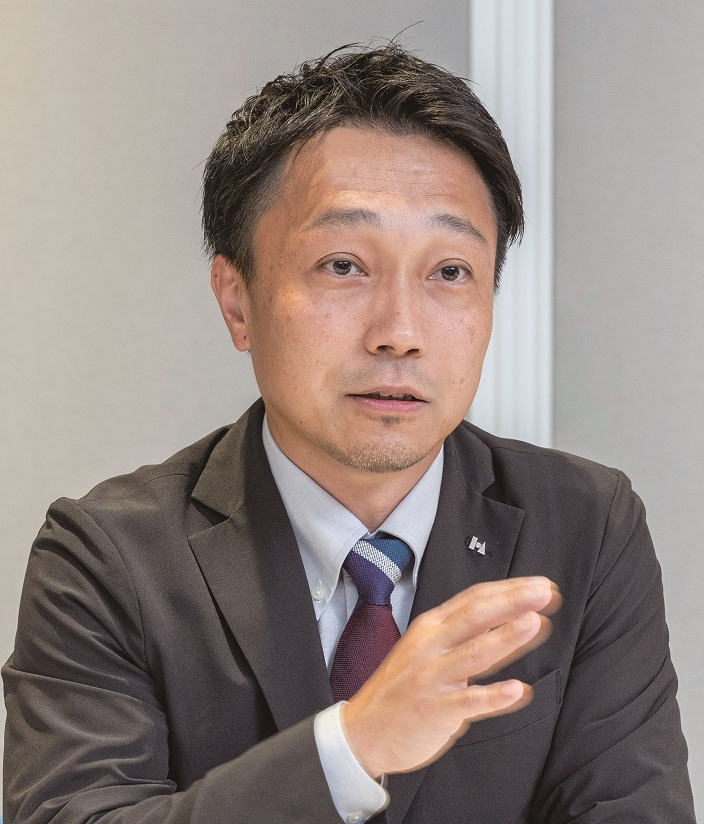
Yagishita: At the time, it was not generally acceptable for men to take childcare leave, not only within this company, but across society as a whole. But when my second son was born, we were faced with the real, concrete question of who would take care of our elder son. That’s what got me to start considering taking childcare leave. I was at the office from morning to evening on weekdays, and I couldn’t leave everything to the grandparents, so I just went for it and took a week of childcare leave. Ideally it may have been better if I had taken a full month or so, but at the time, it wasn’t the type of atmosphere where you could do that. However, after that, younger male employees began to take childcare leave more proactively, so I’m glad I might have been a pioneer in that respect.
Now you are a manager, balancing work and childcare. Handling both must be quite challenging. Have you come up with any methods or techniques to do it, such as when communicating with subordinates or managing your own time?
Yagishita: I inform my team in advance of when I will be leaving the office or whether I will be working from home. If anyone needs to discuss something or if I need to give instructions, then it will be within those time frames. In the past, it was expected that everyone would work late into the night, so I would tend to leave the writing of reports and discussions for nighttime, but now that I have these constraints on my time, I have become much more conscious of using my time efficiently. When I’m busy and want to cut out the time required for commuting to the office, I work from home. Since I’m doing it too, I want my subordinates to feel free to use this option of working from home and remote working as well.
Do you have any advice for employees with children who want to participate more fully at work?
Yagishita: Despite the high workload in the Architecture & Engineering Division, I feel that there are relatively more men taking childcare leave than in other divisions. Recently we’ve been seeing young employees taking a month of childcare leave, with their colleagues covering for their absence. Society and attitudes are gradually changing so that we can send our people off into childcare leave with well-wishes and a pat on the back. Taking childcare leave not only gave me time to enjoy caring for my children, but it also gave me a new perspective on design. I became more aware of designing safe housing for families with children.
I still feel regret that I could not take any childcare leave with my eldest, and even with our second child, I regret not being able to take more time off, so I hope that the company culture will grow to be more accepting of employees expressing their desire to take childcare leave.
Promoting the active participation of foreign nationals
Ms. Nguyen, you currently work at the Brancheile Omiya Koen paid care facility for the elderly with nursing care. Could you tell us what you do in your day-to-day work?
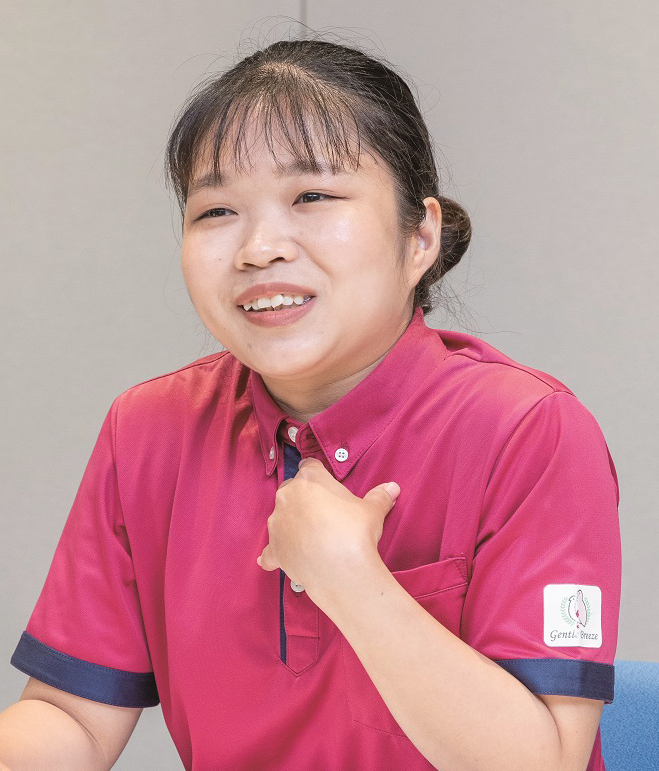
Nguyen: I support residents of Brancheile Omiya Koen in living their daily lives. In concrete terms, I help with things like meals, bathing and toileting assistance. What’s difficult is learning Japanese. Other colleagues I work with teach me technical terms related to the work, and residents also sometimes teach me Japanese words and phrases used in everyday life. I have good relationships with everyone at work.
Have you ever felt happy or fulfilled in your work?
Nguyen: Everyone has been so kind in teaching me things, not only in relation to work, but also for my own daily life. It’s been a great help. Last year I went home to Vietnam for a while to take childcare leave, and when I came back, the residents of the care facility welcomed me so warmly. It made me so happy. My family is now in Vietnam, and my parents are taking care of my child. Sometimes it makes me sad that I cannot see my child, but I never miss an opportunity to communicate with my family in Vietnam, such as with daily video calls. The people living in this facility interact and help each other out. That is the most fulfilling part of my work.
Promoting the active participation of people with disabilities
Mr. Kunii works for Haseko Systems Inc., a special subsidiary that promotes the employment and active participation of people with disabilities. Could you tell us about your day-to-day work?
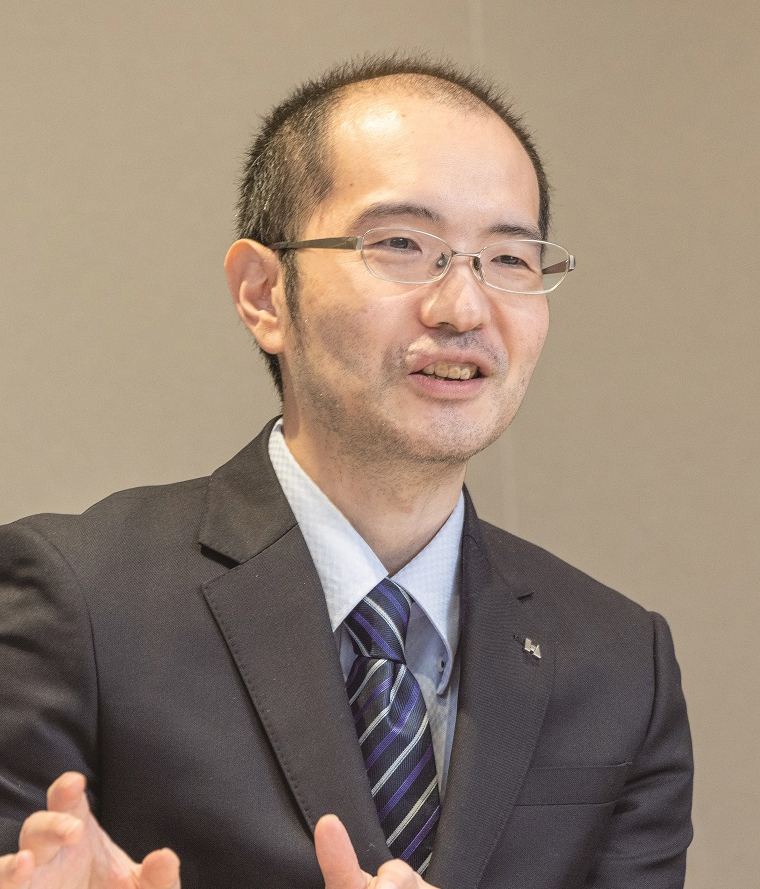
Kunii: My job is to receive orders from clients and convert or process data so that it can be used in promotional tools or direct mails. I sometimes have to handle up to 500 orders in a single day, so speed and accuracy are paramount. I’m now in my ninth year doing this work. I am currently based in the Minamisunamachi office.
The Minamisunamachi office has been designed as an entirely barrier-free workplace, with many restrooms for wheelchair users and a roof over the parking lot so that employees don’t get wet when coming to work. In addition to such facilities, the people working here also have a good understanding of disabilities. People are often checking on me and offering their help, making it a very comfortable place for me to work.
I have heard that you are also participating in the voluntary digital transformation (DX) training that is being implemented at the Company. Please tell us about this initiative.
Kunii: I always had an interest in the subject, and have been studying functions and programming on my own. Having acquired these skills, we are now considering whether we can apply DX to our own work, and we are in the process of exchanging ideas and holding discussions in groups, drawing on examples of successful and unsuccessful DX projects at other companies. Ultimately, we intend to put together a plan that we can implement in our work, and present it to the management team.
If we can come up with a good proposal, we might be able to expand it to the whole Group, meaning we could contribute to making the whole Group more efficient.
Promoting the active participation of senior employees
Mr. Inuzuka, you are active as a specially appointed manager of construction site, even after reaching the mandatory retirement age. After all these years working on the front lines, is there any event or incident that particularly stands out in your memory?
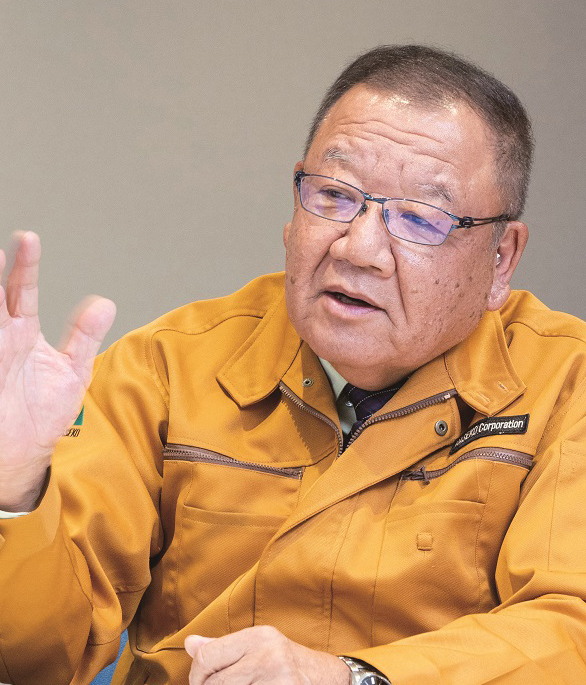
Inuzuka: I will be turning 68 this year and originally retired when I hit 65, but I was given the opportunity to work again due to the Company promoting the active participation of senior employees.
During my time as a regular employee, I was in charge of worksites for many years. I have many stories from when I was a general manager, but it’s the events of the Great East Japan Earthquake in 2011 that stand out in my memory. At the time, I was working on a property of a major general developer with around 750 units. The earthquake struck two weeks before we were going to hand the property over, so we had to carry out an emergency re-inspection. In fact, a week before the earthquake, another construction department had just handed over another property for the same developer. Since this was after the handover, Haseko Corporation employees were unable to enter freely to inspect it, so we had to obtain the developer's permission before beginning. We learned how important it is to move quickly and win trust, even in times of emergency.
What would you say is the DNA of Haseko that you want to pass on to future generations?
Inuzuka: If you work on-site, you will make plenty of mistakes. You can say that you have succeeded if you can hand the property over at the end, but there will be failures both big and small along the way. In both sales and technical fields, Haseko has a culture that encourages people to fearlessly take on challenges. You start working on projects worth billions of yen or even tens of billions of yen from a young age, so you have to be extremely earnest and honest about manufacturing. It is in times of great difficulty that you can truly demonstrate what you're worth. I believe that this “honesty and earnestness in manufacturing” is the DNA of Haseko. I sincerely hope that young people in the future will carry on this Haseko DNA.
How long would you like to continue working?
Inuzuka: I originally retired when I turned 65, so I haven’t really thought much further ahead. I have a lot of work at the moment, including on new construction sites and demolition sites, and I feel that there are many opportunities for senior employees to play an active role especially on demolition sites, where they can draw on the extensive experience they have accumulated over the years. I would like to keep working for as long as I’m needed and I’m physically able.
Kakehashi: As the D&I Promotion Office, we would like to continue to create an environment and company where diverse employees can demonstrate their individuality and work with a sense of purpose, while respecting each other.
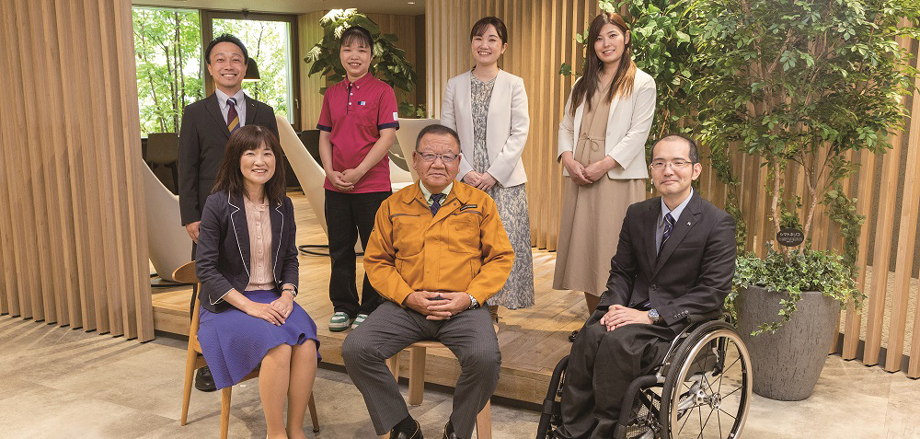
- Sustainability TOP
- Message from the Management
- Message from the Officer in Charge of Sustainability Promotion
- Haseko Group's Sustainability Management
- Climate Change Response
- The Digital Transformation Strategy of the Haseko Group
- D&I at the Haseko Group
- Creating attractive living spaces
- Building a company worth working at
- Protecting the precious environment
- Nurturing a culture of trust
- ESG Data and Disclosures
- External Evaluations and Awards
- Integrated Report
- Philosophy and Policies
- Special feature archives
